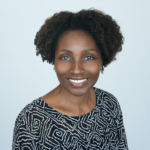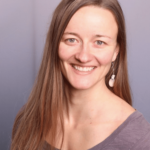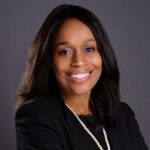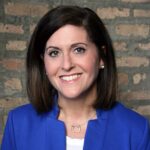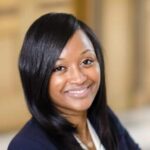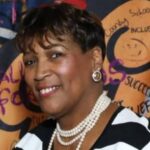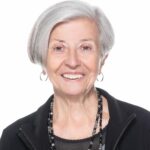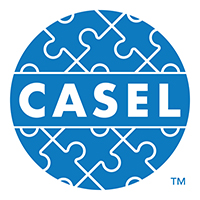2022 SEL Exchange Virtual Summit
Weaving a New Tapestry: Schools, Families and Communities Together
Photo by Shutter Nduljence
The 2022 Virtual Summit was on October 13
Schools, families, and community partners all bring unique and essential expertise to effective engagements that support our students. What does it take to truly collaborate while honoring each voice? What new kinds of conversations can we have to connect our common threads? And what does this have to do with social and emotional learning?
..
2022 Agenda at a Glance
Whether you are an educator, researcher, community leader, policymaker, or caregiver, our sessions on school-family-community partnerships will provide inspiration to align to, support, and celebrate the young people in our lives.
| Welcome: 2022 SEL Exchange – Dr. Bloodine Barthelus, Director of Practice Innovations, CASEL – Dr. Aaliyah A. Samuel, President and CEO, CASEL |
| Session: Building Solidarity-driven Family Engagement Practices – Dr. Eyal Bergman, Senior Vice President, Learning Heroes |
|
Session: Collaborative Contributions-The Mutual Benefits of Community Engagement. Four stories uplifting the power of community-schools connections. Partnership is Power: Building Systems of Hope |
| Session: It Takes the Whole Village – A Call to Action Our role in shaping education policy to protect students’ rights to a quality education – Dr. Aalivah A. Samuel, President and CEO, CASEL – Lakeisha Steele, Vice President of Policy, CASEL |
| Closing – Dr. Bloodine Barthelus, Director of Practice Innovations, CASEL – Dr. Timothy P. Shriver, Board of Directors Chair, CASEL and Chairman, Special Olympics |
*Registrants will have access to ALL sessions on demand until April 14, 2023
2022 Speakers
Click on the speakers below to learn more about this year’s presenters.
2022 Key Takeaways
Trust Is Essential: Engaging Families for SEL
Education is shared work. But while families and educators often want to work together, most school systems don’t support authentic, deep collaboration between schools and homes. Many structures assume that families need to change, not schools. Parents who don’t reflect the mainstream school culture are often treated as spectators and families’ own cultural backgrounds are sometimes neglected. The key to bridging this gap, according to Virtual Summit speaker Dr. Eyal Bergman, is to build meaningful solidarity between families and schools. Schools can cultivate parent-teacher trust and relationships by 1) placing trust and teamwork at the center of family engagement, 2) focusing on student learning and well-being, and 3) building the infrastructure for adults to learn how to do this work better.
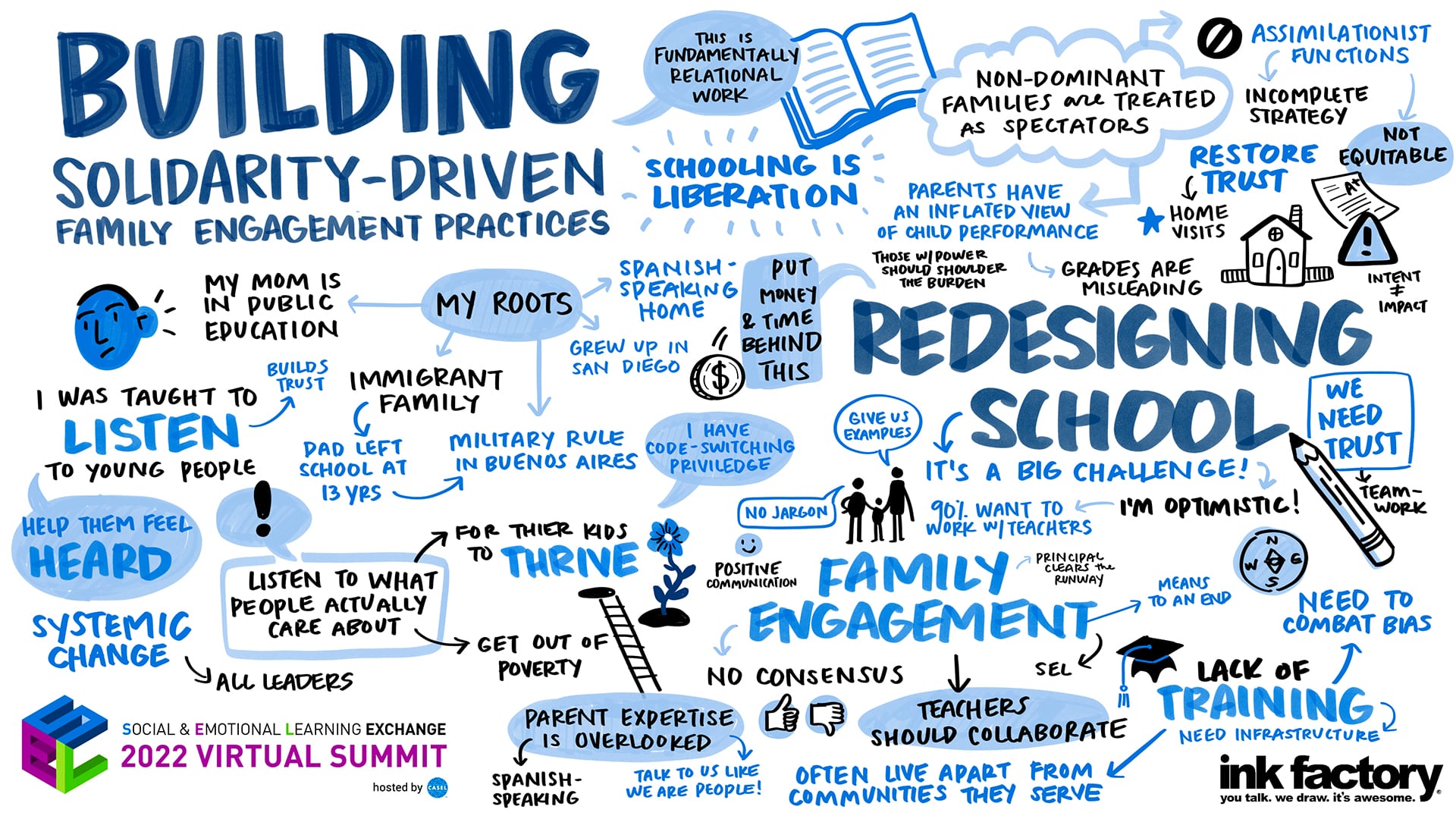
Collaboration Is Power: Engaging the Community for SEL
Weaving a tapestry that brings schools and communities together requires both effort and artistry. As Virtual Summit host Dr. Bloodine Barthelus explained, “When we build partnerships, there’s a commitment to a process that is dependent upon tension that eventually yields beautiful results.” Speakers shared many stories of the beauty and power of collaboration:
- Byron Sanders showed us that partnership is power when working with young people: “If we build ecosystems embedded with SEL, then you are lighting up something very, very special—the belief that tomorrow can be better than today and by acting upon it makes it so, and that is hope.”
- Makayla Reeves, a high school senior, shared her story of listening to her school community’s needs and creating a zen garden project to provide a retreat for students and educators: “I learned to use my eyes to hear … I understand compassion to be the ability to understand and share the feelings of others and transform that into action. We want to encourage others to plant seeds of compassion.”
- Ciara Lowery and Dorothy Styles inspired us with a cross-country collaboration to develop, share, and pilot a new approach for supporting adult SEL: “To change outcomes for youth, the adults serving them must first know themselves. Programs don’t change children; relationships with caring adults do.”
- Dr. Jane Quinn presented evidence of Community Schools as a proven model for integrating holistic supports that remove barriers to student learning: “To make Community Schools work, you have to keep the word ‘yes’ written in your heart.”
Public Education Is a Right: Engaging Policymakers for SEL
Today, states in the U.S. have a legal mandate to provide a quality education to students. This right only exists because parents, educators, and others fought together and made their voices heard. In the current political climate, parents and educators are calling on decision-makers to lead with SEL and live up to the promise of quality education. Parents have a vested interest in supporting educators and education leaders, Keri Rodrigues of the National Parents Union pointed out. “But along with that, we want to make sure that we’re being engaged with the dignity and respect that we deserve as critical stakeholders at that table.” Meaningful family and school partnerships require investment and resources, as well as systems of accountability so families can provide their feedback. When it comes to quality education, it’s time to listen to parents—not politics.
2022 Related Resources (Download Complete PDF Here)
Dr. Eyal Bergman
Senior Vice President, Learning Heroes
Developing life skills in children: A road map for communicating with parents
This communications playbook provides insight to better understand how parents think, feel, prioritize, and
talk about the intersection of social, emotional, cognitive, and academic development, so educators can
find common ground and mutual understanding with family partners.
Embracing a new normal: Toward a more liberatory approach to family engagement
This report by Dr. Karen Mapp and Dr. Eyal Bergman explores the dynamics and barriers that stand in the
way of effective family-school partnerships and outlines how to reach a more liberatory, solidarity-driven,
and equity-focused family engagement practice to support educational excellence for all children.
Dual capacity-building framework for family-school partnerships (Version 2)
Based on research and best practices, this is the most used family engagement framework in American
schools. It is designed to support the development of family engagement strategies, policies, and programs
at the school and system level.
Unlocking the “how”: Designing family engagement strategies that lead to school success
Building from examples of successful schools and districts, this report offers a set of concrete
recommendations for developing comprehensive family engagement strategies that directly impact
student learning and well-being.
Learning Heroes
This national nonprofit conducts research on the nature of the home-school relationship, develops tools to
promote better partnerships, and provides training and support to school/system leaders seeking to
elevate their family engagement strategies.
More on this topic from CASEL
CASEL’s guidance for school districts and schools about how to develop and strengthen partnerships
between schools and families.
Parent and caregiver voices
Listen to stories from real parents and caregivers, like April Ybarra, about why they believe in an education
that prioritizes social and emotional learning (SEL).
Reflection: Authentic partnership with families and caregivers
Spark reflection and discussion among school leadership teams about areas for growth for creating a more
welcoming and participatory school environment for students’ families and caregivers.
Family/caregiver survey on schoolwide SEL implementation
Includes a sample letter and survey items to learn from families and caregivers about their perceptions and
experiences of SEL at their child’s school. Also in Spanish.
Establish norms for data-informed conversations
Includes ways for discussion facilitators to establish a space for collaboration and recommended norms to
ensure that the conversation is inclusive of all voices and results in concrete next steps.
Byron Sanders
CEO and President, Big Thought
Big Thought
This nonprofit supports youth in marginalized communities through arts education, out-of-school time
systems, summer learning, and juvenile justice intervention. They partner with school districts to scale best
practices in SEL. The site describes programs and results, including the Creative Solutions Program.
It’s time to work together to defend SEL
Sanders’ blogs about the high stakes of the moment and the need to act in defense of SEL.
Early lessons from schools and out-of-school time programs implementing SEL
In this report, RAND researchers describe the Partnerships for Social and Emotional Learning Initiative as
well as findings and lessons from the first two years of implementation in six communities.
With appreciation, we acknowledge the trademarked status of PechaKucha and are grateful for the
collaborative stance of their leadership. Visit pechakucha.com/explore.
Makayla Reeves
Lead Team Member—SEL Summit Commission
New Tech High School—Dallas Independent School District
New Tech High School Zen Garden video
This video shows an inside look at the process Makayla and her team went through to identify a need and
design a solution to improve their school community.
SEL Student Leadership Summit booklet
See the agendas and supporting materials for four collaborative sessions with youth leaders, AVID,
community partner organizations, and Dallas ISD leadership. Read summaries of the school-based projects
led by youth.
Student-led empathy interview protocol
See the protocol Makayla and other students used to learn from their peers and identify themes that
shaped their project.
More resources from CASEL on SEL and student leadership
With appreciation, we acknowledge the trademarked status of PechaKucha and are grateful for the
collaborative stance of their leadership. Visit pechakucha.com/explore.
Dorothy Styles
Director of Business Development, Communities in Schools of Atlanta
Ciara Lowery
Program Director, Center for Safe Alaskans
SEL reflection deck
This tool supports staff and leaders in exploring and strengthening social and emotional competencies.
Communities in Schools (CIS)—Atlanta
CIS Atlanta’s mission is to surround students with a community of support, empowering them to stay in
school and achieve in life. They build partnerships between schools and communities to provide tiered
supports to meet the unique needs of all students.
Center for Safe Alaskans—Anchorage Youth Development Coalition (AYDC)
The AYDC is a coalition of over 60 youth-serving organizations, businesses, and individuals, supporting
youth-serving organizations through advocacy, resources, networking, and training as part of their
commitment to promoting student well-being and safety.
More resources from CASEL on supporting SEL for adults
For schools | For districts
With appreciation, we acknowledge the trademarked status of PechaKucha and are grateful for the
collaborative stance of their leadership. Visit pechakucha.com/explore.
Dr. Jane Quinn
Former Director (2000-2018), Children’s Aid National Center for Community Schools
Twenty years, ten lessons: Community schools as an equitable school improvement strategy
Jane Quinn and Martin Blank share a history of community schools and key lessons about implementing
this model.
Community schools as an effective school improvement strategy: A review of the evidence
This report from the Learning Policy Institute and the National Education Policy Center synthesizes 143
research studies on the impact of the Community Schools model on student and school outcomes.
What the four pillars of community schools look like in action
This infographic accompanies the report above, illustrating the four features that appear in most
community schools.
More resources from CASEL on SEL partnerships between schools and community organizations
With appreciation, we acknowledge the trademarked status of PechaKucha and are grateful for the
collaborative stance of their leadership. Visit pechakucha.com/explore.
Dr. Aaliyah A. Samuel (view the graphic notes from Ink Factory)
President and CEO, CASEL
Lakeisha Steele
Vice President of Policy, CASEL
Leading With SEL is a coalition of education organizations and associations in support of SEL, facilitated by
CASEL. This site includes resources you can use to take action in your community.
SEL Is Everybody’s Business is a campaign led by the SEL Providers Association, urging business leaders to
elevate the connection between workforce skills and social and emotional skill-building.
Bipartisan Safer Communities Act—”Dear Colleague Letter” (Department of Education)
This letter encourages states to prioritize funding to school districts that demonstrate a commitment to
social, emotional, and mental well-being of students, engagement with students and families, and policies
and practices that advance equity.
